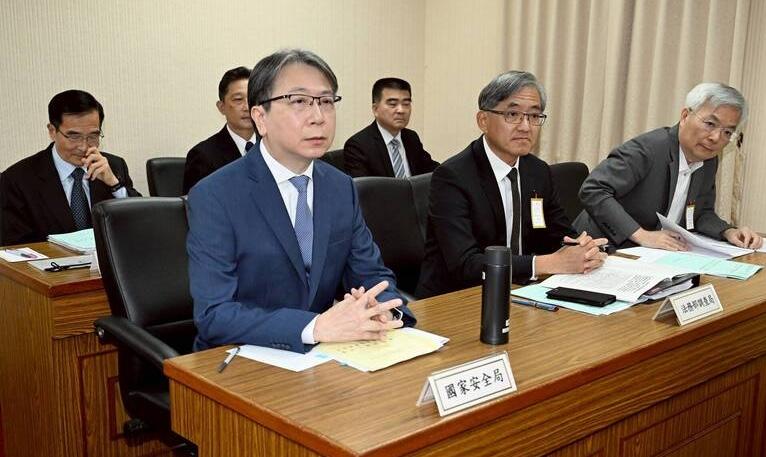Taiwan's top intelligence chief today dismissed as "cognitive warfare" a series of bounties issued by a Chinese provincial government seeking information on the activities of alleged Taiwanese psychological operations officers.
National Security Bureau (NSB) Director-General Tsai Ming-yen (蔡明彥) told a legislative session in Taipei that the notices, which offered cash rewards for leads on 18 purported members of the Taiwanese military's psychological warfare unit, mixed publicly available information with falsehoods.

Photo: Liao Chen-huei, Taipei Times
The Chinese Communist Party (CCP) issues such notices on specific dates — this time, after Double Ten National Day — as part of its coercion tactics targeting Taiwan.
In a public notice issued on Saturday, the Chinese city of Xiamen's public security bureau published photographs, names and the Taiwanese identity card numbers of what it said were 18 "core members" of the Taiwanese military's "psychological warfare unit."
It offered a reward of 10,000 yuan (US$1,401) to anyone who could provide clues about their activities and help in their arrest for alleged "separatist activities."
"But I have to reiterate that many of the photos and information are incorrect," Tsai said.
China has previously issued similar bounties on June 5 for the arrest of 20 so-called Taiwanese military hackers.
Tsai told lawmakers that the NSB has for years been bolstering its protection of NSB members' identities.
However, other national security units, such as those under the Ministry of Defense, regularly publish information regarding their staff following personnel changes, such as transfers or promotions, he said.
Such public information would likely be collected by the CCP for psychological warfare purposes, Tsai added.
The NSB chief said it is in talks with the ministry and other national intelligence units to ensure they use "de-identification," the process used to prevent someone's personal identity from being revealed, as a privacy-preserving technique for their employees.

The first global hotel Keys Selection by the Michelin Guide includes four hotels in Taiwan, Michelin announced yesterday. All four received the “Michelin One Key,” indicating guests are to experience a “very special stay” at any of the locations as the establishments are “a true gem with personality. Service always goes the extra mile, and the hotel provides much more than others in its price range.” Of the four hotels, three are located in Taipei and one in Taichung. In Taipei, the One Key accolades were awarded to the Capella Taipei, Kimpton Da An Taipei and Mandarin Oriental Taipei. Capella Taipei was described by

EVA Airways today confirmed the death of a flight attendant on Saturday upon their return to Taiwan and said an internal investigation has been launched, as criticism mounted over a social media post accusing the airline of failing to offer sufficient employee protections. According to the post, the flight attendant complained of feeling sick on board a flight, but was unable to take sick leave or access medical care. The crew member allegedly did not receive assistance from the chief purser, who failed to heed their requests for medical attention or call an ambulance once the flight landed, the post said. As sick

The Taichung District Court yesterday confirmed its final ruling that the marriage between teenage heir Lai (賴) and a man surnamed Hsia (夏) was legally invalid, preventing Hsia from inheriting Lai’s NT$500 million (US$16.37 million) estate. The court confirmed that Hsia chose not to appeal the civil judgement after the court handed down its ruling in June, making the decision final. In the June ruling, the court said that Lai, 18, and Hsia, 26, showed “no mutual admiration before the marriage” and that their interactions were “distant and unfamiliar.” The judge concluded that the couple lacked the “true intention of

INDUSTRY: Beijing’s latest export measures go beyond targeting the US and would likely affect any country that uses Chinese rare earths or related tech, an academic said Taiwanese industries could face significant disruption from China’s newly tightened export controls on rare earth elements, as much of Taiwan’s supply indirectly depends on Chinese materials processed in Japan, a local expert said yesterday. Kristy Hsu (徐遵慈), director of the Taiwan ASEAN Studies Center at the Chung-Hua Institution for Economic Research, said that China’s latest export measures go far beyond targeting the US and would likely affect any country that uses Chinese rare earths or related technologies. With Japan and Southeast Asian countries among those expected to be hit, Taiwan could feel the impact through its reliance on Japanese-made semi-finished products and